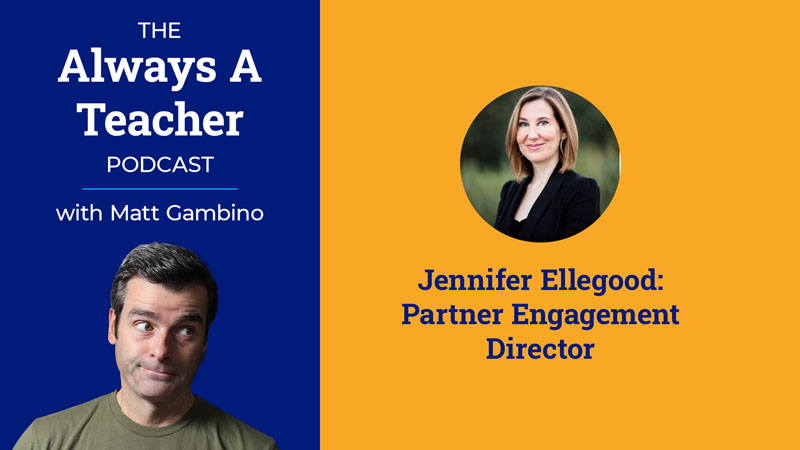
Show Notes
In this episode, I'm thrilled to talk with Jennifer "Jenny" Ellegood. Jenny has been in the edtech space for 18 years and is currently the Partnership Engagement Director at Imagine Learning. At her core, she is a "teacher at heart," and her story is a perfect example of a steady, thoughtful, and successful transition from the classroom.
Jenny's decision to leave teaching was "mostly financial," but she didn't just leap. She used a brilliant "risk mitigation strategy" by keeping one foot in the classroom. For two years, she worked her new, entry-level edtech job during the day while also continuing to teach English composition at night. This allowed her to confirm her new path was the right fit before making the full transition. She shares fantastic, practical advice for teachers, from her perspective as both a former educator and a senior hiring manager.
- The "One Foot In" Strategy: Jenny's "risk mitigation strategy" of working her new edtech job while still teaching night school for two years to ensure the move was right.
- Using Your Teacher Superpower: The number one teaching skill she uses in professional development? Differentiation. She explains how she has to "fly blind" to assess teachers' different skill levels in a PD session and "adapt on the fly."
- The Feedback Loop: Why she loves that her companies (both past and present) are "receptive to customer feedback." She explains the power of being able to go back to a teacher months later and say, "Hey, we heard you, and look what we have for you."
- Why She Hires Teachers: As a hiring manager, Jenny says she would "hire a teacher any day of the week." Why? They are punctual, caring, hard workers, motivated learners, and have a "growth mindset."
- How to Get the "Edge": Her top advice for applicants: Lead with your product knowledge. If you've used that company's product—or even a competitor's—it gives you a "huge edge" because you have day-to-day knowledge of "the good, the bad, and the ugly."
- The Corporate Learning Curve: The non-teaching skills she had to learn, like what a 401(k) was and, most shockingly, that you can (and should) negotiate your salary.
Episode Article
My guest this week is my friend, Jennifer "Jenny" Ellegood, a "teacher at heart" who has built an incredible 18-year career in edtech. Today, she's a Partnership Engagement Director at Imagine Learning, where she builds and manages teams of professional development specialists. Her journey is a masterclass in making a smart, intentional, and low-risk transition from the classroom.
Jenny’s decision to leave teaching was, as it is for many, "mostly financial." But she was hesitant to leave a job she truly loved. So, she created a "risk mitigation strategy." For two full years, she lived a double life: she worked her new, entry-level job at National Geographic Learning during the day, and then she continued to teach English composition at night. This "one foot in, one foot out" approach allowed her to slowly transition, confirming that her new career path was the right fit before she fully "cut the cord."
In her edtech roles, she found she was still, as she says, "always a teacher." Her main job is training teachers, and her most-used skill is differentiation. "You're kind of flying blind," she explains, unlike a classroom where you have data. "You're figuring it out as you go... As a teacher, you're used to adapting on the fly, and you're doing exactly that in PD, too." She identifies the "teacher leaders" in the room and "lifts them up" to help their peers—a classic classroom strategy.
Now, as a hiring manager herself, Jenny says, "I would hire a teacher any day of the week, even if I worked in a career other than edtech." She finds that teachers are punctual, caring, motivated, and have a growth mindset. She never has to worry about her team (made up of former educators) being unproductive while working remotely.
So, what does she look for when hiring? Her number one tip for transitioning teachers is to lead with your product knowledge. "I'm surprised by how many people don't lead with that," she says. "If you've used any products, curriculums, digital platforms... that's something that you absolutely want to let the interviewer know... that does give you an edge." She also advises being open to starting at an entry-level position (like she did) or using part-time and contract work to "gain some experience." Jenny’s story proves that you don't have to give up being a teacher to build a new and rewarding career.
